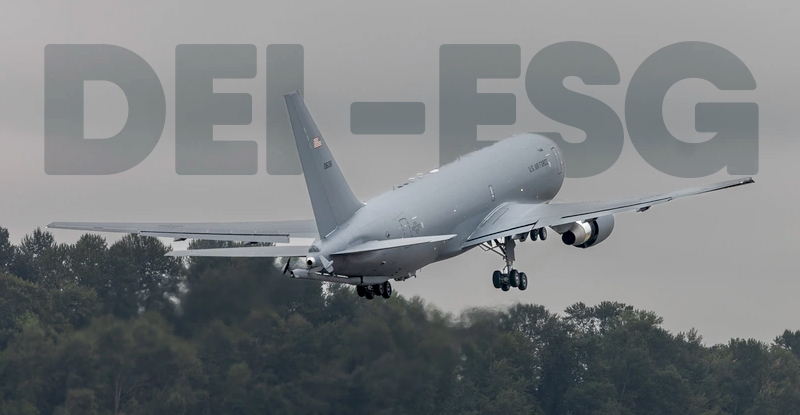Information Operations podcast host L. Todd Wood interviews retired Navy Captain Tom Burbage, USNA ’69, and former F-35 Program Director at Lockheed Martin about aviation safety in the U.S and the defense industry which has been forced by the government to implement DEI ideologies in their programs.
Capt. Burbage is the President of the Calvert Task Group, which is an organization for Naval Academy grads and Navy veterans and works closely with STARRS and the MacArthur Society of West Point Graduates.
Watch:
Related:
Alleged Insider says Boeing’s woes are symptom of ‘failure of our elites’ and DEI ‘ripping our society apart’ (Fox News, 9 Apr 24)
One of the most prominent critics of DEI, academic Chris Rufo, spoke to an alleged insider from embattled plane manufacturer Boeing about how political ideology has handicapped one of America’s greatest industries.
Boeing is arguably America’s most famous manufacturer of airplanes, missiles, and satellites, but has also made numerous headlines amid a conversation about entire industries being handicapped by commitments to Diversity, Equity and Inclusion (DEI) and Environmental, Social and Governance (ESG) policies.
In January, Alaska Airlines canceled all flights on Boeing 737-9 Max aircraft through Jan. 13 after a midair blowout left a gaping hole in the plane and forced an emergency landing in Portland, Oregon, as startled passengers clutched oxygen masks.
Boeing’s alleged insider told City Journal that, far from an anomaly, Boeing is
“just a symptom of a much bigger problem: the failure of our elites. The purpose of the company is now ‘broad stakeholder value,’ including DEI and ESG. This was then embraced as a means to power, which further separated the workforce from the company. And it is ripping our society apart.”
ESG, standing for Environment, Social and Governance, can be roughly summarized as adhering to various liberal causes in exchange for investment or loans of credit. DEI, standing for Diversity, Equity and Inclusion, can be roughly defined as adhering to liberal identity politics in practice, either in the workplace or in an institution like academia. Both of these have been blamed for various entertainment franchises, corporations, or government institutions under-performing.
The insider argued that the problem, “At its core” is that “we have a marginalization of the people who build stuff, the people who really work on these planes.”
This, he says, began after two 737’s crashed in the past few years, one of which could be attributed to an engineering failure, eventually leading to a “sweeping set of changes that caused huge turnover in talent.”
Now, the anonymous source says, much of the company’s new leadership are not only outsiders to the industry, but live far away from the actual factories themselves.
What the person does say asserts daily dominance over the company is DEI.
“Status games rule every boardroom in the country,” the alleged insider said.
“The DEI narrative is a very real thing, and, at Boeing, DEI got tied to the status game. It is the thing you embrace if you want to get ahead. It became a means to power.”
The insider suggested further that while DEI seems like a small thing, it fundamentally changes a company.
The source added that such ideology is fundamentally “anti-excellence, because it is ill-defined, but it became part of the culture and was tied to compensation.”
The person also noted that this led to the “politicization of HR” which he says is “a real problem in all companies.”
This has allegedly caused yet another rift between leadership and staff, “If you look at the bumper stickers at the factories in Renton or Everett, it’s a lot of conservative people who like building things—and conservative people do not like politics at work.”
One key detail the insider emphasized is that “radicalization of HR doesn’t hurt tech businesses like it hurts manufacturing businesses.”
“Because [tech businesses] are paying 30 percent or 40 percent more than the competition in salary, they are able to get the top 5 percent of whatever racial group they want. They can afford, in a sense, to pay the ‘DEI tax’ and still find top people,” the person said.
“But this can be catastrophic in lower-margin or legacy companies. You are playing musical chairs, and if you do the same things that Google is doing, you are going to end up with the bottom 20 percent of the preferred population.”
Another aspect why DEI capture of a company like Boeing is such “visible example” is “every problem—like, say, a bolt that falls off—gets amplified. But this is happening everywhere around us, and it is going to have a huge effect. DEI and ESG became a way to stop talking honestly to employees.”
The insider finished by blasting DEI and ESG as a cheap substitute for actually caring about good craftsmanship for one’s customers.
“It’s a form of cheap self-love that is being embraced by leaders. If you pay the tax to the DEI gods or the ESG gods and use coded language with your workforce, it absolves you of the hard work of really leading,” the source said.
“No. Service means you are spending the extra time to understand what’s really happening in the factory and in your supply chain. There should be some honor in understanding that we inherited something beautiful and good and worth loving.”
Boeing prioritizing diversity and inclusion over flier safety, Elon Musk says after near-catastrophic Alaska Airlines mishap (New York Post, 11 Jan 24)
Elon Musk ripped Boeing over a filing that appeared to show the aeronautical giant two years ago began using diversity, equity and inclusion goals as incentives for executive compensation after previously focusing solely on safety and quality controls.
“Do you want to fly in an airplane where they prioritized DEI hiring over your safety? That is actually happening,” Musk said on X on Wednesday.
The billionaire, whose comments followed a nearly-catastrophic Alaska Airlines flight that suffered a fuselage panel blowout over the weekend, was reacting to a screenshot that showed a proxy statement from Boeing filed with the Securities and Exchange Commission.
Beginning in 2022, the aircraft manufacturer changed its incentive plan from giving executives bonuses based on passenger safety, employee safety, and quality to rewarding them if they hit climate and DEI targets, according to the filing. . . . (read more)
An insider explains what has gone disastrously wrong with Boeing








Leave a Comment